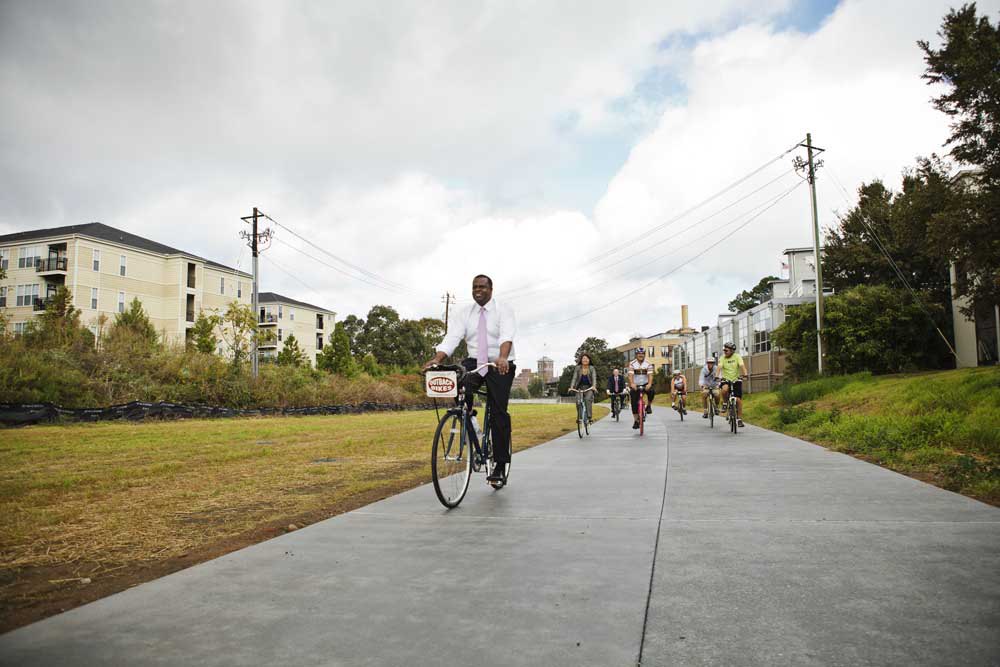The Atlanta BeltLine is a work in progress, but the walking and biking trails have already gained popularity across the city. The multibillion dollar project, however, is primarily funded by a Tax Allocation District, or TAD, which uses a portion of property tax revenue that would otherwise be allocated to the Atlanta Public Schools and Fulton County. In return for reallocation of tax revenues for BeltLine development, the city is required to make fixed payments to APS and the county over time. Although the city has remained up to date on payments to Fulton County, payments to APS have recently lagged behind.
In 2005, the BeltLine TAD was created by then Mayor Shirley Franklin. In an agreement negotiated between APS, the City of Atlanta and Invest Atlanta, both APS and Fulton County agreed to give any increases in the amount of property tax revenue they would receive from the TAD to the city.
“The intention for APS to enter this agreement was to provide a way for them to contribute to the development of the Beltline without assuming an unreasonable amount of risk,” APS spokesman Billy Linville said.
In return for the funds from the TAD, the city is obligated to make annual and biannual payments to the schools and county until the projected completion date of the project in 2035. The payments to APS will total $165 million and increase over time, peaking at $16 million a year. The most recent sum of $6.75 million was due in January 2014. According to Linville, this sum has still not been paid. Another $6.75 million is due in January 2015.
City officials maintain that the delay in payment is not a breach of contract because the contract stipulates no legal action is warranted until the cumulative missed payments total $15 million are two years late.
According to Linville there have been no formal negotiations regarding the issue, but if these were to take place, APS would be prepared.
“We fully expect the city to make the payment that is owed currently and the next payment,” Linville said.
An email exchange obtained by The Atlanta Journal-Constitution through open records requests reveals heated discussions between APS and the city over late payments. When APS lawyers pressed the city for the funds to be paid, city attorney Cathy Hampton wrote back by pointing to the recession.
“The agreement dates back to 2005, prior to the collapse of the real estate market, and includes terms that are not viable in today’s economy,” she said.
In 2005, city officials expected that the TAD would support 60 percent of the project’s costs. After the recession kicked in, however, this estimate shrunk. Currently, it is expected to fund only 33 percent of the $4.3 billion.
“There were risks on all sides,” Linville said. “And I think the recession impacted everyone involved.”
In Decemeber 2013, the board of directors for Atlanta BeltLine adopted the 2030 Strategic Implementation Plan, which outlines the completion of the project over 17 years. The initial Atlanta BeltLine Redevelopment Plan anticipated that the TAD would provide up to 66 percent of total funding. The SIP anticipates using the $4.3 billion generated by the TAD as a tool to leverage other funding sources which include federal, regional and local funding in addition to private donations.
“The economic impacts of the Great Recession resulted in reduced revenue and delayed delivery dates for several projects,” Jenny Odom, communications and media relations manager for the Atlanta BeltLine, told The Southerner via email.
Odom said the BeltLine investments are expected to significantly increase the APS share of the tax base. According to Odom, the long-term effects will result in higher revenue from the BeltLine TAD that can be invested in the school system directly once the TAD is retired at the end of 2030.
“The Atlanta BeltLine is already providing safe routes for students to get to and from school,” Odom said. “When completed, the multi-use trails and transit will connect more than 40 schools over 45 neighborhoods. New public infrastructure in form of trails, transit and parks will create safe, healthy mobility options for parents and children and will improve access to healthier lifestyles. Healthier neighborhoods will create healthier students that are better prepared to learn and succeed.”
According to Linville, the money that is owed could go to early education, college preparation programs and other services to help struggling students.
“For Atlanta Public Schools this is all about the students,” Linville said. “We are good partners with the city and want to help the city, which is why the contract was engaged to begin with. But nothing is more important than education and developing our children in the classroom, and that’s where our focus is.”







